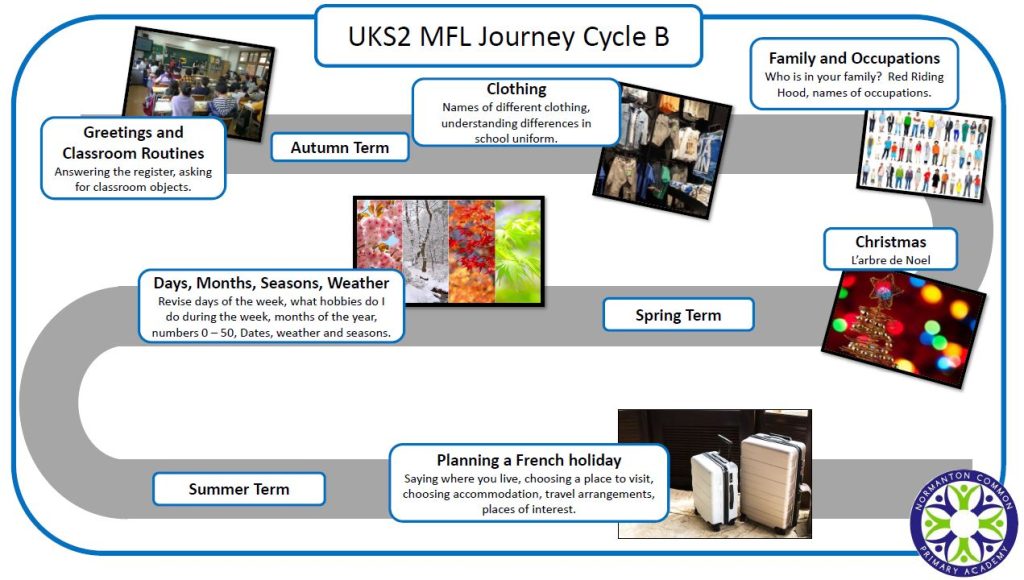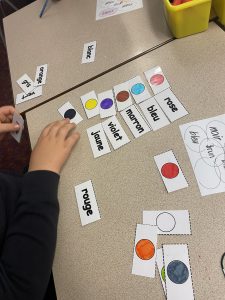Subject Leader : Emma Parkinson
At Normanton Common, we aim to provide a high-quality Languages curriculum to our Key Stage Two children. We do this for several reasons. We believe that many children really enjoy learning to speak another language. We are committed to early language learning and believe that the earlier a child is exposed to a foreign language, the faster and more effectively the language in question is acquired. We therefore believe that it is desirable to introduce a new language to children when they are at primary school, as they tend to be less self‐conscious about speaking aloud at this stage of their development.
It is widely believed that the early acquisition of a foreign language facilitates life-long language learning. We believe that learning a foreign language helps all pupils develop their interests and curiosity in the similarities and differences between themselves and others. This includes learning about countries, cultures, peoples and communities. Learning a foreign language helps pupils to extend their communication skills and enhances self‐esteem.
In Languages pupils will have the opportunity to:
- ask and answer questions.
- use correct pronunciation and grammar.
- memorise words.
- interpret meaning.
- understand basic language and grammar.
- write using the target language.
- communicate in pairs, groups and as classes.
- examine life in another culture.
How is the content / theme chosen?
The content is chosen from the Wakefield MDC French Scheme of work, written by Rachael Redfearn and adapted to make effective links with themes and ensure coverage of the expectations as set out in the National Curriculum programmes of study. At Normanton Common Primary Academy, we ensure a clear, sequenced progression, which is taught systematically for all pupils to acquire the intended knowledge and skills. The content may be adapted or changed, based upon the needs or interests of specific cohorts.
Click on the link below to see an overview of our MFL Curriculum:

How do we ensure progression of knowledge and skills?
At Normanton Common Primary Academy we have in place, for each subject area, a knowledge and skills progression document, which is used for planning, to ensure sequenced and appropriate content for specific year groups. Teachers are clear on the learning and expectations for each year group, as this has been carefully selected and mapped out so that children are building on prior knowledge and skills each term and each year. Within these documents there are opportunities for differentiation, in order to meet the needs of all learners.
How is the subject taught?
Languages lessons are carefully planned through themed units of work. A two year, long term rolling programme maps out the coverage of the discrete teaching and learning opportunities for children to develop and embed specific skills. This ensures coverage of the National Curriculum, for Languages across Key Stage 2. Each unit of teaching is planned, based upon age appropriate knowledge and skills, as well as the needs of the cohort or individuals within it.
There is a strong focus on developing the vocabulary of our children and retention of this through practical learning opportunities. New vocabulary is taught, with the emphasis on key words and phrases. Although we actively introduce and are ambitious with the language we use, we understand the importance not to over complicate this language but ensure underlying principles and meanings of the words are taught and understood. Children are introduced to and reminded of key vocabulary. Questioning is used to check their understanding and prior knowledge, before new concepts, skills or knowledge are introduced. Modelling is used by class teachers to clarify expectations, children are then given plentiful opportunities to consolidate, build upon and apply basic skills and knowledge, across a series of lessons, as well as across the year.
Languages permeate throughout our curriculum and allows us to develop the ‘Challenge & Educate’ side of our school curriculum. The children in Key Stage 2 are provided with equal access to the Languages curriculum and have suitable learning opportunities regardless of gender, ethnicity or home background. Through their growing knowledge and understanding of the French language, children gain an appreciation of life in other cultures and learn that people around the world have more similarities than they do differences.
How do we know that our children are making progress?
Ongoing assessments of the children’s knowledge and skills is observed by the teacher. Misconceptions are addressed and next steps carefully planned. Children’s outcomes are compared to the subject specific skills and knowledge documents. At the end of a unit teaching (or half termly) subject leaders gather an overview of children’s outcomes in each subject area. This is used to plan appropriate next steps for their future learning, as well as provide an overview of learning within a subject area across KS2.
How do we promote our Curriculum Intent?
Active Learners
- Children work collaboratively in pairs, small groups and teams.
- Children develop in confidence as their listening, speaking, reading and writing skills improve.
- Children make their own choices.
- Children are creative, independent, as well as demonstrate a sense of pride in their work.
- Children recognise how to sensitively respond to others when offering evaluations of their work.
- Collaboration is promoted and are part of our school ethos, which in turn supports the development of independence, pride, belonging and the establishment of good relationships (including teamwork).
- Children are taught the skills of resilience and perseverance, which prepare them for the challenges that they are given in school, as well as the wider world.
- Children develop an interest and curiosity in the world around them.
Active Citizens
- Children develop an interest and curiosity in the similarities and differences between themselves and others.
- Children examine life in other cultures.
- Language learning supports the development of greater self-esteem, self-control, and the ability to rise to a challenge through developing their resilience.
- Children are given opportunities to develop their interest and creativity across the language curriculum which in turn supports their mental wellbeing.
Active Communicators
- Children learn subject specific vocabulary, linked to a range of topics and themes.
- Children learn to ask and answer questions using correct pronunciation and grammar.
- Children memorise vocabulary and use this to interpret meaning in different texts.
- Children talk about likes and dislikes (giving reasons).
- Children present their work to others.
- Children are taught to evaluate and improve their work and are encouraged to use their collaborative skills.
- Children work individually, in pairs, groups and as a whole class.
What wider opportunities are provided for our children?
Languages in action...

